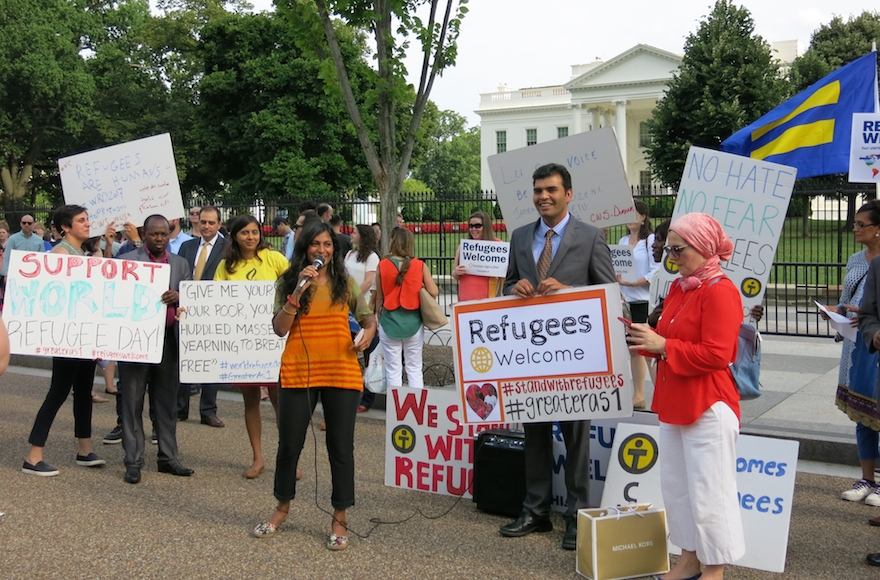HIAS, immigrant aid group vilified by Pittsburgh gunman, vows to not back down
Published October 27, 2018

HIAS was among the organizers of a rally in front of the White House to call for refugee protections on World Refugee Day, June 20, 2017. (HIAS)
(JTA) — Before he slaughtered 11 people in a shooting at a Pittsburgh synagogue, Robert Bowers blamed one Jewish organization: HIAS, an immigrant aid group that has been helping refugees since the 1880s.
ADVERTISEMENT
“HIAS likes to bring invaders in that kill our people,” he wrote on his website. “I can’t sit by and watch my people get slaughtered. Screw your optics, I’m going in.”
In vilifying HIAS, Bowers targeted an organization that helped get the American Jewish community on its feet as it burgeoned more than a century ago. Its mission has shifted as the number of Jewish migrants has fell to a trickle, from helping its own to advocating for others. It’s also an organization that, even in the face of opposition to refugee admissions from the White House, has maintained broad support from a Jewish community that is otherwise increasingly fragmented.
“It’s not going to affect our mission one iota,” HIAS President and CEO Mark Hetfield told JTA Saturday night, regarding the shooting. “If anything, it’s reinforced the need for the Jewish community to be a welcoming community.”
Once, HIAS’ goal was to welcome Jews to the United States. Founded in 1881 as the Hebrew Immigrant Aid Society, it provided resources and education to Jews moving to the U.S. It later took an active role in the movement to free Soviet Jewry.
ADVERTISEMENT
Then, as Jewish immigration evaporated in the 1990s, HIAS shifted to becoming a refugee resettlement agency for non-Jews. It is now one of nine agencies tasked with resettling refugees in the United States.
Until 2015, the group stayed mostly apolitical and focused on navigating the bureaucracy involved in bringing refugees to the country and finding them homes. But that year, the refugee crisis rose to the top of global consciousness, and Donald Trump launched a presidential campaign centered on reducing the flow of undocumented — and even legal — immigrants to the United States.
Soon after his inauguration, Trump signed the first in a series of executive orders barring refugees, as well as the residents of a number of Muslim-majority countries, from the United States. With that, HIAS — which was accustomed to working with the government — found itself on the front lines of opposition to the Trump administration.
It has since advocated for the admittance of refugees, mobilized Jewish communities and synagogues to its cause and fought Trump’s travel bans in court.
“That’s the most troubling thing — refugees were really a bipartisan issue,” Hetfield told JTA in 2017. “Some people say HIAS is a liberal agency or progressive Jewish agency. We’re really not. Our whole focus has been refugees, and refugees are not a partisan issue. It really became politicized over the past couple of years.”
HIAS may not have the backing of the White House, but its issue remains popular across the Jewish community. All four major movements opposed Trump’s travel ban last year. More than 400 congregations are part of its “Welcome Campaign.” Last week, it organized a “refugee Shabbat” across synagogues, focused on talking about helping refugees.
Hetfield says the group has faced opposition in the past. But he said he never expected anything as bad as the tragedy Saturday.
“We’ve been aware that there are people out there that despise HIAS and our mission of welcoming refugees to this country, as hard as it is to understand,” he said. “Its going to make us more aggressive and focused in speaking out against hate — hate directed at refugees, hate directed against Jews.”














